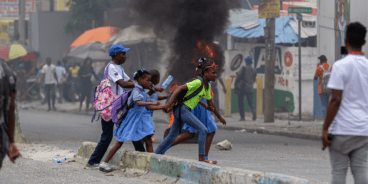
Our Responsibility to Protect Syria’s People
Op-ed in the West Australian by Executive Director of the Global Centre for the Responsibility to Protect, Dr. Simon Adams
When cruise missiles fell on Colonel Muammar Gaddafi’s forces last month, President Barack Obama and others justified the barrage as a regrettable but necessary result of the international community’s “responsibility to protect” the Libyan people.
The recent arrest of former president Laurent Gbagbo of Ivory Coast was similarly said to represent a victory for the concept of the responsibility to protect.
Mr Gbagbo’s rejection of unfavourable election results and his willingness to reignite civil war and incite ethnic massacres necessitated his removal.
Otherwise Ivory Coast was in danger of developing into a slow motion re-run of Rwanda, with the world once again cast as passive spectator to mass murder.
Action in Libya and Ivory Coast was initiated via the United Nations Security Council.
So as Syrian President Bashar al-Assad’s tanks roll through the streets of Deraa and security forces gun down protesters, it seems only logical the eyes of the world turn again to the plush debating chambers in New York to see what the Security Council will do next.
The answer, for now, appears to be very little. Ideas have a life of their own. In political terms, “appeasement” will forever be associated with Neville Chamberlain’s 1938 gifting of a slice of Czechoslovakia to Adolf Hitler.
Chamberlain’s justification was not just that by giving Hitler someone else’s country he could hopefully prevent a wider European war, but also that the German-Czechoslovakian conflict was occurring in “a faraway country between people of whom we know nothing”.
Much has changed since then. Notwithstanding the deadening influence of the Cold War upon the effectiveness of the UN, the new century has seen genuine progress.
Despite the UN’s inability to halt Darfur’s horror, no significant world leader suggested this African conflict was too distant or obscure for us to be concerned. The magnitude of the crime demanded our attention.
Until recently even Colonel Gaddafi, with his record of brutality, desired to be seen as a paragon of human rights virtue. Libya’s representatives at the UN had previously manoeuvred Libya into the position of Chair of the UN Human Rights Commission, a shameful achievement that says as much about Colonel Gaddafi’s aspirations as it does about the UN’s failures.
The real challenge of international relations in the 21st century is to transform the UN into a more effective body, and give substance to its declarations and resolutions.
In 2001 former Australian foreign affairs minister Gareth Evans co-chaired an international committee that developed the concept of “the Responsibility to Protect” (or R2P).
The basis of R2P is that all humans, regardless of where they live, have a right to be protected from genocide, war crimes, ethnic cleansing and crimes against humanity.
The responsibility to protect them falls, first and foremost, upon their sovereign government. However, if that government proves unable or unwilling to exercise its responsibility, the world community is obligated to act.
Never again should a Rwanda or Srebrenica be allowed to occur as the world looks away.
The R2P was unanimously adopted at the UN’s World Summit in 2005. Until recently, however, it was unclear that if faced with a glaring case of a government committing mass atrocities, whether R2P could provide a genuine rallying point for action.
Crucially, R2P formed the core of the Security Council’s resolutions on Libya and Ivory Coast. But this does not mean that similar action on Syria is either possible or likely.
Syria has stronger ties with important regional powers (not least of all Iran) compared with Libya, and Mr al-Assad has more legitimacy and control than Mr Gbagbo.
But R2P has never been a “one size fits all” concept. It requires nuance. And somewhere between discreetly looking away while the army drives tanks over protesters, or lobbing missiles into the presidential palace, there is room to increase the pressure on Syria to meet its responsibilities. As Gareth Evans recently argued, “even if we can’t do everything we should, shouldn’t we at least do what we can?”
It would be a tragedy for the UN, and especially for the Syrian people, if the world body decides to sit this one out.
The Responsibility to Protect stands for an end to amnesia, impunity and inaction. Nevertheless, at the moment the loudest noise coming out of the UN with regard to Syria is not a call for action, but the sound of shuffling feet.
Related Content


11th Meeting of the Global Network of R2P Focal Points Outcome Document
